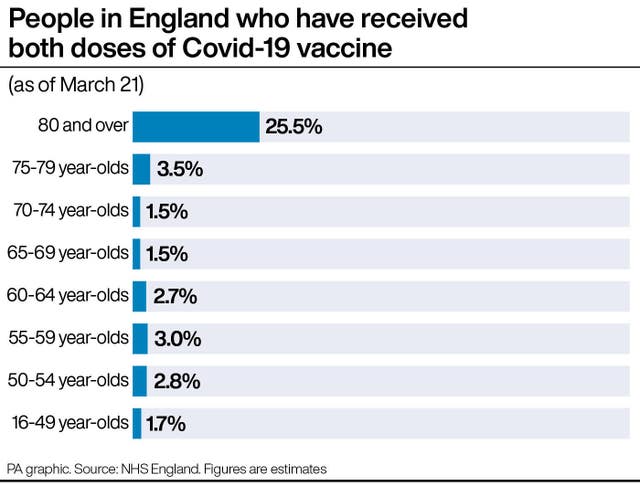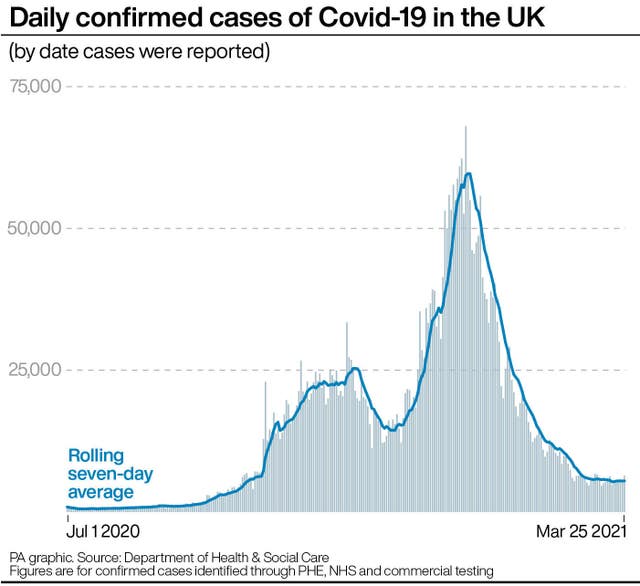Vaccinated people should be allowed to see each other
There is also no scientific rationale in stopping elderly vaccinated people from travelling, Professor Tim Spector said.

Vaccinated people should be allowed to visit one another and there is no real science stopping this from happening, an expert has said.
The UK is in a much better place than hoped, and consideration should now be given to the mental health of people and the needs of the elderly, said Professor Tim Spector.
Prof Spector, who leads the Covid Symptom Tracker app study which is run by King’s College London, suggested there is also no scientific rationale to stop vaccinated people from travelling.
He told the PA news agency: “I think we’re actually in a much better place than many people are telling us, and I, for one, I’m not worried too much about what’s happening abroad.
“I think we need to start talking about when people who have been vaccinated can start seeing other vaccinated people.
“And there’s no real science now stopping, for example, me seeing my vaccinated mother in a care home or, you know, wherever they live.
“So I think we need to start moving to this next area and realise that our plan is working, and that we were doing well.”
Asked if this would mean bringing forward such meetings ahead of the road map out of lockdown, Prof Spector said: “If we’re being led by the science, that’s what we’d be led by.
“But we’re not, we’re being led by politics, and I can see the arguments for not splitting the country into two.
“At the same time, given the mental state of many people, and the needs of elderly people, I think that ought to be equally considered.”

He explained that the optimum scenario would be where both people have had two doses of the vaccine.
Prof Spector said: “But the dangers after one dose are certainly that you’re not going to get anything that’s going to put you into hospital.
“You might get mild disease possibly in a really rare occurrence, but you know these are still going to be very rare.
“I think ideally, yes, wait for both vaccines for both people, but I think once you’ve gone over a month after your first one, most people are going to be safe to see people who are free of Covid and themselves vaccinated.”
Prof Spector said there had been a lot of talk of keeping away from Europe and holidays abroad because travel may bring variants to the UK and make vaccine efforts worthless, but the idea that borders can actually stop viruses moving has been disproved many times.
He told PA: “I think this is a bit of a smokescreen, and I think we do need to realise why we have areas of the country that are hard to get rid of the virus.
“Anyone travelling from an area of low Covid to an area of high Covid is obviously putting themselves more at risk of getting infected, so that’s a consideration even within this country.
“But if you’ve been vaccinated, and many of the elderly people have, there’s no scientific rationale to stop them from travelling.”
Mark Woolhouse, professor of infectious disease epidemiology at the University of Edinburgh, said: “The maxim for border closures in a highly internet-connected world, the kind we live in at the moment, is that they delay, but do not prevent the arrival of new pathogens or new variants of an existing pathogen.
“If the Government chooses to curtail travel, that will not prevent the problem, that will not prevent the next wave.
“The idea that somehow bringing in extra cases from overseas tips the balance and sends us into an epidemic we wouldn’t have had without that is just simply wrong.”
He added: “It can delay the arrival of these new variants, but it’s very unlikely we can stop them.
“Delaying is good if you use the time, so what are we going to do with the time that we bought by delaying it?
“And I think the Government has to think very, very hard about why it needs to delay, what strategies it’s going to put in place.”
Prof Spector said there are currently 4,500 to 5,000 new Covid-19 cases a day in the UK, with a UK prevalence of about 73,000 people infected.

He added that the figures had not changed much in the last 10 days or so, but that he hoped this plateau would start to drop off again by next week.
Prof Woolhouse said the data over the last few weeks had been a lot better than was initially expected when lockdown started.
He told PA there was a concern about how effective lockdown measures would be against the Kent variant, but the restrictions have proven to be effective, with the number of cases coming down quite fast, and hospital admissions and deaths coming down even faster.
Prof Woolhouse added: “The reason of course they’ve come down even faster is because we’re already beginning to see significant impact with the rollout of the vaccination programme.”





